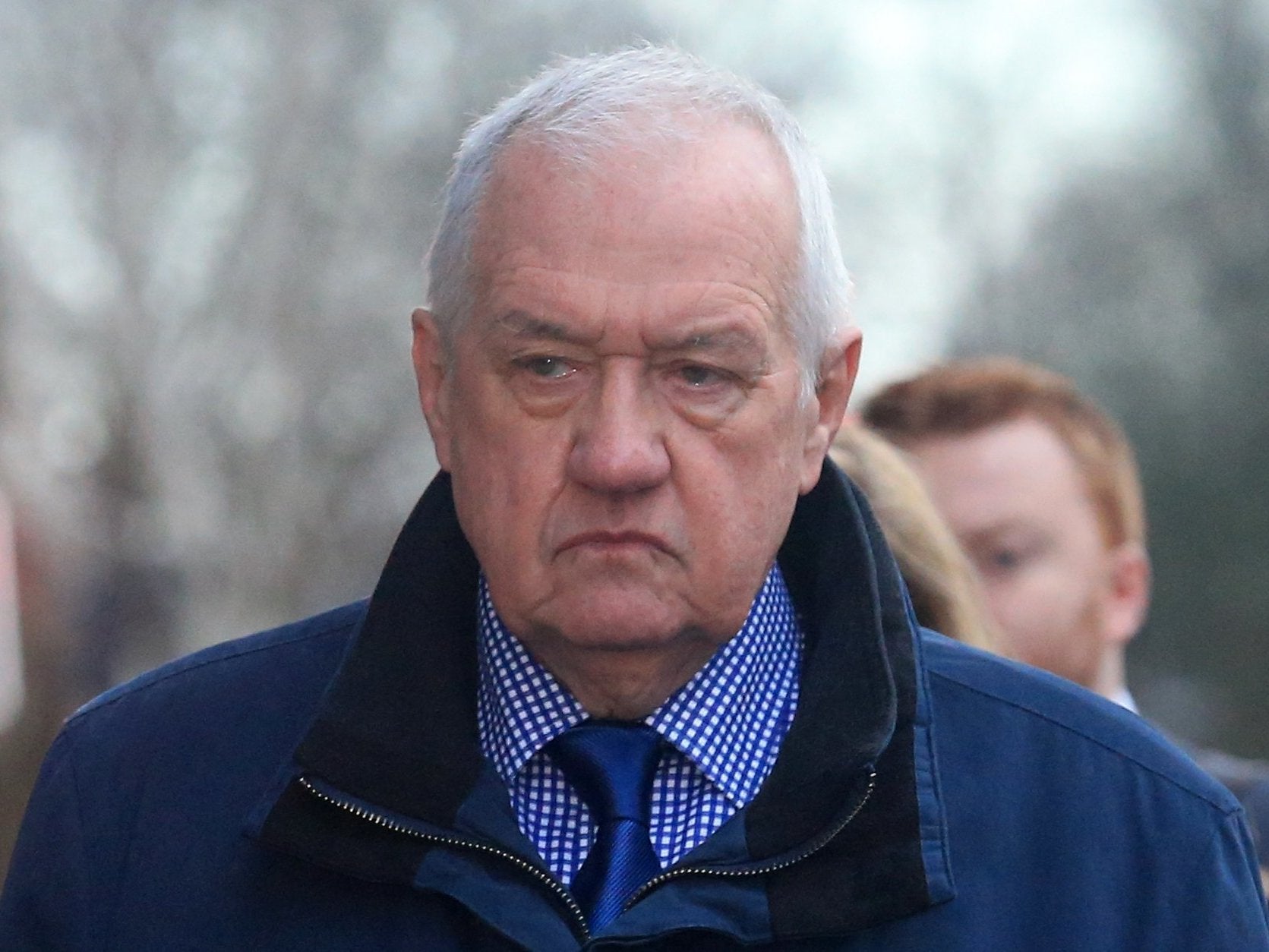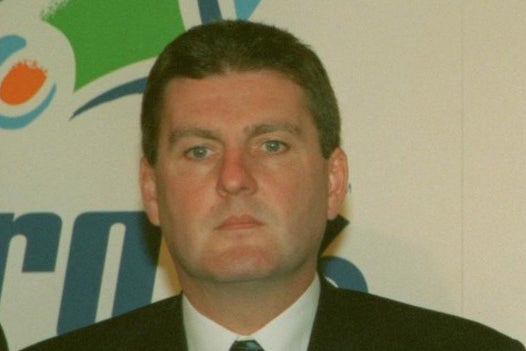Hillsborough trial: 'Extraordinarily bad failings' by match commander David Duckenfield caused fatal crush, court hears
David Duckenfield denies manslaughter of 95 victims
“Extraordinarily bad failings” by David Duckenfield led to the deaths of 95 Liverpool fans at Hillsborough stadium, a court has heard.
A prosecutor said the match commander, a former South Yorkshire Police chief superintendent, had “criminal responsibility” for the deaths of men, women and children who were crushed in the disaster.
Mr Duckenfield, now 74, sat metres away from victims’ relatives as all 95 names were read out at Preston Crown Court on Tuesday.
He denies manslaughter, while Sheffield Wednesday’s former safety officer Graham Mackrell pleads not guilty to two health and safety offences related to the stadium.
Richard Matthews QC, for the prosecution, told jurors that “many individual failures” played a part in the “appalling” events that unfolded on 15 April 1989.
“Undoubtedly, each of the deceased has been failed by many, in many ways and over a protracted period; before, during and even after this disaster,” he added.
“But is the prosecution’s case that Mr Duckenfield’s failures to discharge his personal responsibility were extraordinarily bad and contributed substantially to the deaths of each of those 96 people who so tragically and unnecessarily lost their lives.”
Ninety-four of the 96 victims died on the day of the disaster, while Lee Nicol passed away as a result of his injuries two days later.
There can be no prosecution over the death of the 96th victim, Tony Bland, as he died more than a year and a day after his injuries were caused.
Opening the prosecution’s case, Mr Matthews said that the match itself was not extraordinary, and mirrored the 1988 FA cup semi-final that was played between Liverpool and Nottingham Forest at Hillsborough.

He told the jury that in addition to failures in planning, organisation and management of the arrival, entry and accommodation of 50,000 football fans, there were also “many collective and individual failures to intervene effectively once the disaster unfolded”.
Mr Matthews said Mr Duckenfield did not declare the situation a “major incident” in good time, to put in place emergency measures to release those trapped and to provide adequate emergency medical attention and resuscitation.
“In the minutes before and after 3pm, 96 people received fatal injuries as a result of crushing in the central pens of the west terrace of the Leppings Lane end of the Hillsborough stadium,” he added, saying the youngest victim was just ten years old and many were teenagers.
“Each of those who died did so as a result of participation in the wholly innocent activity of attending a football match as a spectator, as a consequence of the obvious and serious risk to life posed by crushing from poor management of the expected capacity crowd … and as a result of the extraordinarily bad failures by David Duckenfield.”

The jury was shown images of the areas of Hillsborough stadium, which was the third-largest football ground in the UK at the time, where around 24,000 Liverpool fans attended the match.
Mr Matthews said that as thousands of spectators arrived, there were fears of injuries at turnstiles outside the stadium and a large exit gate known as Gate C was opened “following requests for Mr Duckenfield to do something to alleviate the crush”.
He told the jury that a large crowd was “naturally drawn” through a tunnel directly in front of the turnstiles, down a slope and into fenced pens where there were “no means to escape”.
Mr Duckenfield “gave no thought to the inevitable consequence of the flood of people through Gate C,” the prosecutor added. “He made no attempt to even monitor what was occurring, let alone take a step to avert the tragedy.”
Mr Mackrell, Sheffield Wednesday’s former safety officer, is accused of violating a government-issued safety guide and the terms of the stadium’s safety certificate regarding entry arrangements.
“It is the prosecution’s case that Mr Mackrell effectively shrugged off all responsibility for these important aspects of the role he had taken on as safety officer,” Mr Matthews added, detailing a lack of signage for alternative routes to standing terraces.
Mr Mackrell denies two health and safety offences.
Judge Openshaw said the Hillsborough disaster has received a “huge amount of publicity” for the past 30 years.
“What any of you have heard or read or seen in the past is entirely irrelevant to your task,” he told the jury.
“You decide what happened and whether these charges have been proved and you do so based on what you see and hear in the court, and nowhere else.”
The trial continues.
See our live coverage from the trial below
Please allow a moment for the live blog to load
The charge against Mr Mackrell concerns an alleged safety certificate condition breach on the 1h April 1989.
Mr Matthews says the club was required to agree, before the match, with the South Yorkshire Police officer in charge, "the methods of entry into the stadium and that this meant the arrangements of and number of turnstiles to be used for admission into the West Stand terraces and north-west terraces"
Mr Matthews says: "There may have been other breaches of the safety certificate by the club, but it is only the breach of Condition 6 by the club that Mr Mackrell is alleged to have agreed to, turned a blind eye to or contributed through his neglect of duty as Safety Officer."
Mr Mackrell became Sheffield Wednesday's club secretary at the end of 1986, and wrote to Sheffield City Council saying he was responsible for all aspects of safety within the ground the following year
Mr Matthews says that Hillsborough stadium's structure and features, including signage, had been criticised and that although problems predate his arrival at the club, they are "an important backdrop to the allegations that Graham Mackrell faces".
Mr Mackrell is accused of failing to take reasonable care as safety officer and had violated two parts of the Green Guide.
Mr Matthews says Mr Mackrell should have taken care that turnstiles were sufficient to admit spectators at a rate whereby no unduly large crowds would be waiting for admission" and make contingency plans "in case the arrangements for entry go wrong and what to do to cope with lots of people waiting to get in".
He adds: "It is the prosecution’s case that Mr Mackrell effectively shrugged off all responsibility for these important aspects of the role he had taken on as safety officer. That abdication of responsibility continued from the time that his club was given the semi- final to host, on the 20th March 1989, right up to and including the day of the match and the unfolding events of the tragedy."
Mr Matthews is repeating warnings to the jury made by the judge:
"You may well have heard, read or seen information about the Hillsborough disaster and, undoubtedly, much has been generated about it. You may think you know about the facts of the disaster, but you need to appreciate how important it is to the vital role you will play in this court that you put everything you may have gathered to one side. It cannot help you in the task you will perform in this court."
Mr Matthews says some witnesses have died or are unable to be called to give live evidence, and that previous accounts may be read in court.
Others "may be reminded of what they said or believed much nearer the time or subsequently", he adds.
Mr Matthews says witnesses "may have differing views as to whose responsibility a particular task or role was, some may even proffer explanations for the failures that occurred"
He adds: "None, we anticipate, will suggest anything other than that David Duckenfield had both an ultimate and a personal responsibility for the policing operation in respect of the safety of those attending the match and, in particular, a personal responsibility to take reasonable care in respect of the risk of death from crushing that was present throughout."
Mr Matthews tells the jury: "Whatever any witness may suggest in this court as to what else may have contributed to cause that fatal pressure in pens 3 and 4, David Duckenfield’s failures made a more than minimal contribution – whatever else contributed, David Duckenfield’s failures played a significant role in causing the deaths."
Mr Matthews says it is an "agreed fact" by all parties in the case that the 95 victims died as a result of crushing in pens 3 and 4 from the pressure of the number of people entering them
But he says "the prosecution have to prove is that David Duckenfield’s extraordinarily bad failings to do his job on that day, in other words to discharge his responsibility, made a significant contribution to causing that fatal crushing"
The prosecutor tells the jury: "We the prosecution are not calling evidence to prove that David Duckenfield’s failings were the only cause of that crush only that David Duckenfield’s exceptionally bad failings were a substantial cause."

